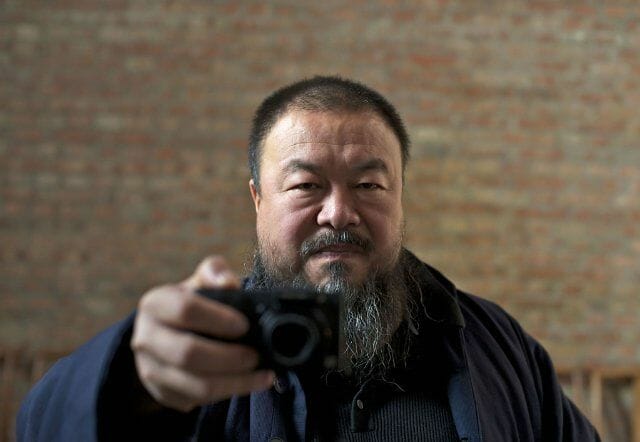
Filmmaker Alison Klayman gained an astonishing level of access to the celebrated Chinese artist-activist Ai Weiwei in the years following the opening of Beijing’s Bird’s Nest Stadium in 2008. No sooner was the stadium completed, however, than Ai—a design consultant on the stadium—became both the Games’ and the building’s most vociferous critic, calling them symbols of state propaganda. The criticism immediately made Ai a persona non grata in the eyes of the Chinese state but, to the free world, he was an exciting and shockingly frank artist from a place in sore need of one.
Ai’s 2008 brush with state authorities was only the beginning of his escalating agitation with China’s government—something that Klayman compellingly illuminates in her debut documentary, Ai Weiwei: Never Sorry. Her portrait of the artist as a witty sociopolitical critic chronicles the challenges of finding justice and transparency in a repressive state. Indeed, the price for Ai’s agitation led to the demolition of his Shanghai studio and his own three-month detention in 2011. Through interviews with Ai, his relatives and art-world colleagues and curators, we get as fully rounded a picture as possible of an artist who—by virtue of his personality and his political realities—maintains a wry, restrained poise.
Klayman follows Ai’s campaigns to document and expose the names of children who died in the 2008 Sichuan Earthquake. Incensed by the government’s cover-up of shoddy school construction and the names of the dead, he journeys to the region with a camera and a team of volunteers. The episode leads to Ai being beaten up and detained by police, his being hospitalized as a result and to an ambitious installation in Munich, memorializing the children who died in the quake.
The Sichuan episode prompted authorities to shut down his blog because he listed the names of the dead schoolchildren. Klayman also follows Ai as he demands an official investigation behind his being assaulted by the police. These sections are the documentary’s best, revealing Ai’s shrewdness—and his sense of mischief—in having a camera trail him as he navigates the bureaucratic labyrinth of the state. He knows fully that his efforts in seeking justice will end in vain, but justice isn’t his objective so much as to expose the system’s demoralizing absurdities. By following the rules of the game, Ai exposes how absurd its rules are and how futile one’s expectations for justice.
Hence, political activism becomes performance art, in much the same way as the campaigns of the most brilliant revolutionaries are, at their core, performance art, designed to expose (rather than overturn) injustice so that the people’s outrage can arise naturally, organically. Social media itself has become both a protest forum and a kind of ongoing, politically charged art project in Ai’s hands. With his legions of online followers, Ai takes to Twitter, broadcasting and commenting on his skirmishes with the authorities.
In her aims to paint a picture of a courageous artist, a revolutionary worshipped by his admirers and Twitter followers, Klayman risks turning her documentary into a publicity machine for its subject. Over and over again, Klayman’s interviewees—many of them Western art critics and curators—pile on the praise for the man, lauding his courage and his cleverness. Ai absolutely deserves all the admiration he gets—every day he exists, he risks arrest—but Klayman’s documentary often rides that fine line between journalism and a puff piece.
Still, Ai Weiwei is too commanding and fascinating a figure to ignore, and Never Sorry is an excellent showcase for why he matters to the world. Whether he’s photographing himself shattering a Neolithic Chinese vase or stenciling the Coca-Cola logo on an ancient urn, Ai’s artwork always manages to provoke, forcing us to consider the individual’s place at the intersection of history and the future, commerce and heritage, the machinery of the state and the creative ingenuity of a single citizen.
Director: Alison Klayman
Writer: Alison Klayman
Starring: Ai Weiwei, Danging Chen, Ying Gao, Evan Osnos, Changwei Gu
Release Date: July 27, 2012